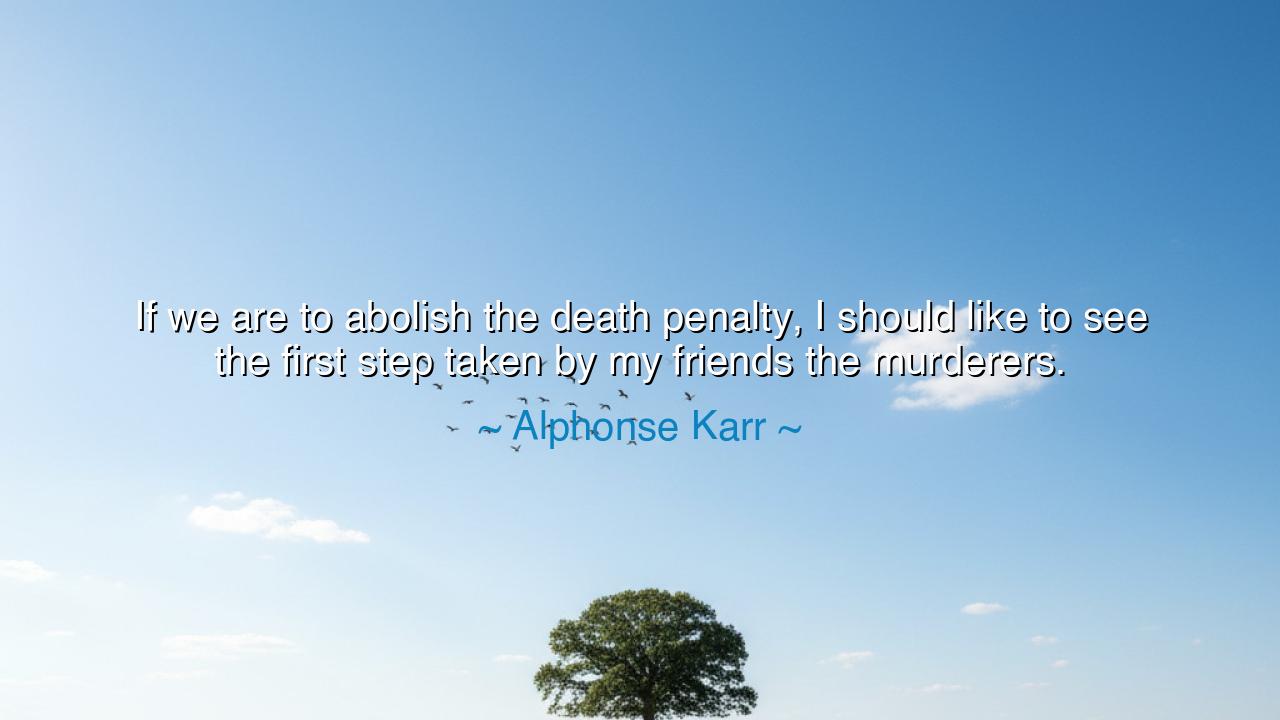
If we are to abolish the death penalty, I should like to see the
If we are to abolish the death penalty, I should like to see the first step taken by my friends the murderers.






The words of Alphonse Karr — “If we are to abolish the death penalty, I should like to see the first step taken by my friends the murderers.” — are as sharp as the blade of irony itself. Beneath their wit lies a profound and unsettling meditation on justice, mercy, and the nature of human responsibility. Karr, a French journalist and satirist of the nineteenth century, did not speak these words in cruelty, but in the ancient spirit of paradox — to remind humanity that before we judge the law, we must first examine the heart of man. His sentence cuts both ways: against the cold machinery of execution, and against the hand that sheds innocent blood. It is the voice of one who sees clearly that to end violence, one must begin not with the state, but with the soul.
To understand the meaning of Karr’s remark, one must first know its time. France, in his day, was still haunted by the guillotine, that grim symbol of revolutionary justice. It stood not only as an instrument of punishment, but as a warning, a spectacle, a ritual of power. The debate over the death penalty was fierce — philosophers like Victor Hugo condemned it as barbaric, while others defended it as necessary for the protection of order. Karr, ever the ironist, pierced through the noise with this single remark. He was not mocking compassion; he was revealing its difficulty. He was saying, in effect: “You wish to end death by decree? Then let us first end murder by choice.” For to abolish the death penalty while men still kill freely is like trying to extinguish fire by denying its heat.
This truth, ancient and enduring, lies at the heart of all moral struggle. The laws of men may restrain evil for a time, but they cannot abolish it. Only the transformation of the heart can do that. The ancients knew this well. In the dialogues of Plato, Socrates argues that laws alone cannot make a man virtuous — only knowledge of the good can. So too does Karr, with biting humor, remind his readers that mercy without morality becomes hypocrisy. To call for the end of punishment while men still embrace violence is to demand fruit without tending the tree. Thus, his quote, though seemingly cynical, is in truth a call for inner reform before outward reform — a teaching both moral and eternal.
Consider the story of Mahatma Gandhi, who centuries later would take up the same dilemma in a gentler voice. Gandhi opposed the death penalty, yet he did not call for its abolition through rebellion or decree. Instead, he sought to awaken the conscience of the people, teaching that violence — whether from the state or the individual — is born from the same poisoned root: hatred. He urged men to conquer their enemies not by force, but by truth and forgiveness. In this, Gandhi accomplished what Karr only hinted at — for he asked not the state, but the murderer within us all, to take the first step toward peace.
There is a deeper wisdom here still. When Karr says, “my friends the murderers,” he does not mock the condemned — he acknowledges the shared guilt of humankind. Every act of cruelty, every indulgence in anger, every desire for vengeance, is a shadow of the same impulse that drives the killer’s hand. We are, in our hearts, capable of the same darkness we condemn. Thus, his statement becomes not an accusation, but a mirror: before we ask the world to abandon violence, we must purge it from our own nature. The first abolition must happen in the secret chambers of the soul. Only then can we demand it of the world.
And yet, Karr’s irony hides compassion. For beneath the jest is the wish that such a transformation might one day be possible — that humanity might evolve beyond its need for blood. His words are the wisdom of a realist who dreams, knowing that laws may be written in a day, but hearts are changed over generations. He reminds us that justice and mercy must walk together, lest one become cruelty and the other weakness. A society that kills without reflection becomes barbaric; a society that forgives without repentance becomes naïve. True civilization stands between — in the delicate balance between accountability and compassion.
The lesson, then, is this: before seeking to abolish the scaffold, abolish the violence within yourself. Refuse to live by hatred, revenge, or fear. Teach your children reverence for life, not only in word but in action. Forgive where you can, and restrain where you must, but never forget that justice begins in the heart. Only when humanity ceases to delight in vengeance will the gallows crumble of its own accord.
So let us remember the wit and wisdom of Alphonse Karr not as cynicism, but as prophecy. For when the murderer himself lays down his weapon — when the heart of man learns peace — then the death penalty will no longer be debated, for it will no longer be needed. Until that day, the challenge stands before every soul: to conquer not the body of another, but the violence within. For only in that conquest does mercy become truth, and only in that truth can the world at last be free.






AAdministratorAdministrator
Welcome, honored guests. Please leave a comment, we will respond soon